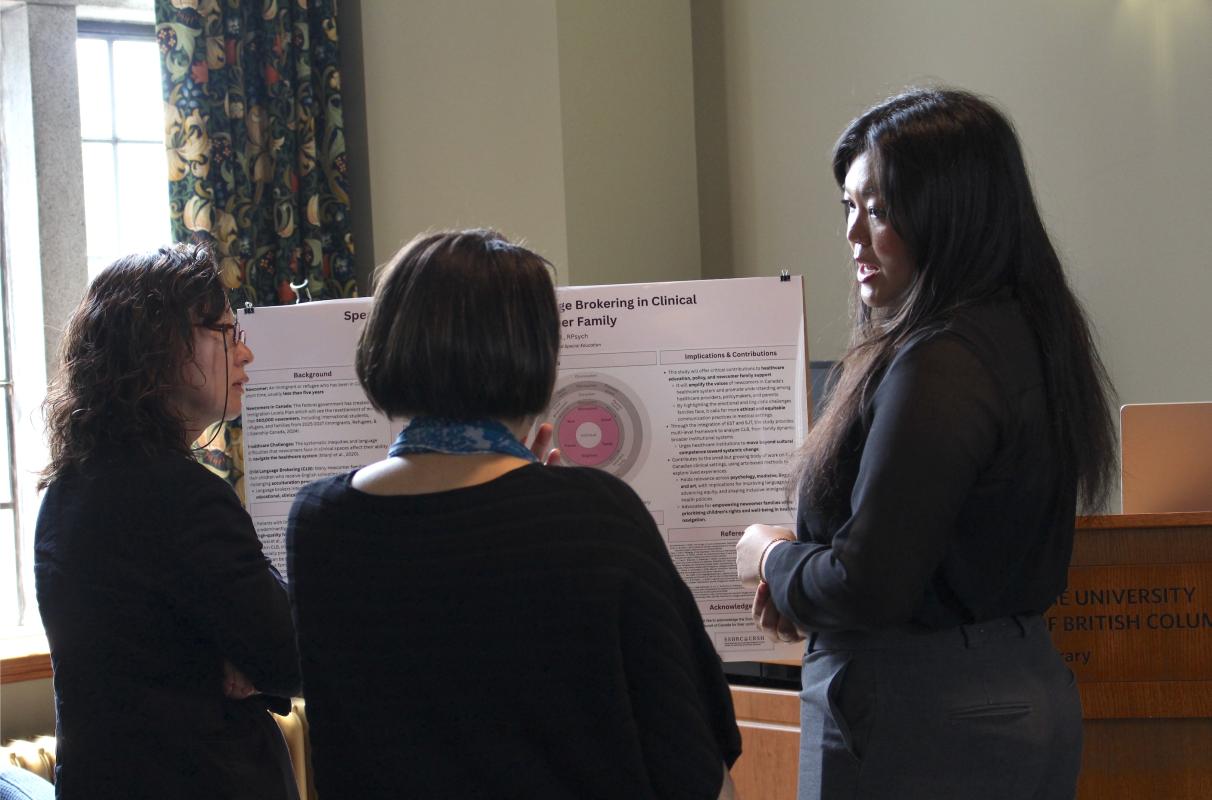Best Poster Award - Laurie He (Educational and Counselling Psychology, and Special Education, UBC).
Title: Child Language Brokering in Clinical Contexts: An Arts-based Engagement Ethnography with Newcomer Youth and their Families
(This is one of two Q&As with award-winning presenters at the Research Day. To read the other, please follow the link at the bottom of this article.)
1. We would love to know more about the origin story of your research. What drew you to this field and what inspired you to present on this topic?
I’m currently a master’s student in the School and Applied Child Psychology program, and I’ve always known that I wanted to work with children in both clinical and research settings. As a Chinese Canadian, bilingual, and daughter of immigrant parents, I was immediately drawn to Dr. Kassan’s work on child language brokering (CLB). This topic deeply resonates with me—growing up, I often acted as a language broker for my family, navigating complex situations in English on their behalf. This personal connection makes the research feel especially meaningful. My previous research experiences in healthcare settings, often working with marginalized groups, have also shaped my current interests. I feel so honoured and privileged to be pursuing work that I not only love but also connect on a personal level with!
2. Tell us a little bit about your experience on Research Day 2025. How did you find the event, and what do you think it means for graduate research at UBC?
I first heard about Research Day 2025 on a graduate newsletter I received via email. Coming from a different department, I was initially hesitant to submit my abstract as I wasn’t sure if my psychology-focused project would be a good fit. However, I took a chance and submitted, and I’m so glad I did! I felt really excited to be accepted and present my research at the event. I was able to meet so many wonderful people, exchange ideas, and have conversations that helped me reflect more deeply on my own research. I believe events like these give graduate and postdoc students a platform to share their passions and celebrate how far they’ve come. Personally, I left the event with a free cookie and a little ball of glowing light in my chest, and I wouldn’t ask for more.
3. Looking ahead, where do you see your research taking you in the next few years?
After I successfully (and timely – fingers crossed!) defend my master’s thesis on this topic, I’d want to continue this line of research into my PhD. I see myself continuing to be passionate about social justice and amplifying the voices of newcomer families in Canada, especially in the healthcare system. I’d love to help further develop the current project and even create a documentary highlighting participants’ experience. At the same time, it’s my dream to take on more of a health psychology edge in my research – particularly supporting children regardless of language background—as they transition back into school following hospitalization. I hope to continue sharing my work at research days and conferences like these, to raise awareness and share meaningful findings.
4. How do you think UBC can better support graduate research initiatives?
I think funding is a big one — there’s definitely room for UBC to provide stronger financial support for graduate research. Beyond that, I think it’s crucial to create known spaces where minoritized researchers feel safe and empowered to share their work. I wouldn’t have discovered and applied to Research Day 2025 if I hadn’t randomly checked my email! Additionally, I appreciated how interdisciplinary the event felt. My project draws from art, psychology, linguistics, and medicine, and it was refreshing to see that welcomed. UBC should continue to encourage cross-department collaboration, community building, and professional development to ensure graduate research initiatives thrive.
Read Q&A with Danica Reid, winner of the Best Talk Award at Language Sciences' Graduate and Postdoctoral Research Day 25'.
